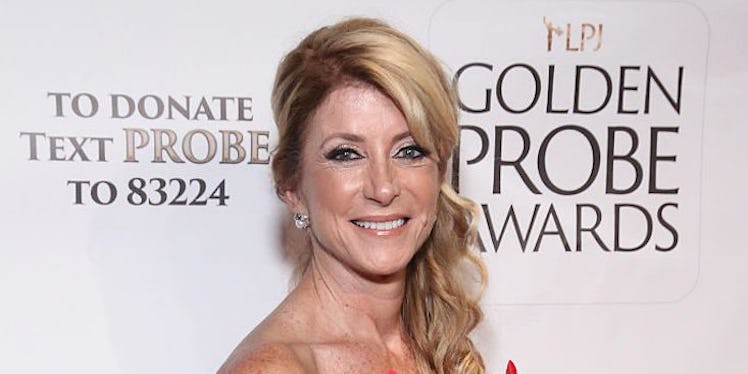
This Is Where Wendy Davis Draws The Line On Democrats And Abortion Support — EXCLUSIVE
Rep. Ben Ray Luján, the chairman of the Democratic Congressional Campaign Committee (DCCC), set off a firestorm of arguments when he told The Hill that his party would be open to supporting candidates who are against abortion rights. This claim led to ongoing discussions about the values of the Democratic party. To get more perspective, I spoke to Wendy Davis about Democrats and support for abortion access in an interview with Elite Daily.
Davis was a senator in Texas when she gained national fame for filibustering an anti-abortion bill in pink sneakers in 2013. Although her filibuster did not hold, the law she was protesting was ultimately struck down by the Supreme Court in 2016. She went on to make an unsuccessful run for Texas governor in 2014 and to found Deeds Not Words, a community for young women, in 2016.
At the end of July, Luján told The Hill that "there is not a litmus test for Democratic candidates," essentially meaning that a person does not have to support abortion rights to be a Democrat. This was met with shock from many, as the Democratic party has long been on the side of pro-choice politics. To many, myself included, it felt like Luján -- a man, no less -- was saying that the party was perfectly willing to sacrifice abortion rights -- and, by extension, women's rights -- for votes.
Davis has ample experience supporting abortion rights as a politician, so I was interested to hear her perspective on the debate.
As Davis sees it, a politician's personal beliefs on abortion DON'T determine their political party.
Instead of personal beliefs, Davis looks at actions. She had Democratic colleagues in the Texas Senate who did not personally support abortion, "but they did not impose their personal beliefs on what other people could and should do."
"I have no problem with the Democratic party getting behind someone whose personal beliefs are at odds with abortion," she explains. "What I have a problem with is when a person allows their personal belief to interfere with a woman's right to make private decision about her own bodily liberty and autonomy for herself. That's where I would draw the line."
That concept is similar to Democratic Senator Tim Kaine's stance. Kaine, a devout Christian, explained during a vice presidential debate last year that although he personally does not support abortion, he trusts women to make their own decisions, so doesn't let his religion get in the way of his votes.
Meanwhile, the DCCC's flimsy abortion stance does not line up with national beliefs.
Sixty-nine percent of Americans support upholding Roe v. Wade, the Supreme Court case that made abortion legal in 1973, according to a national poll of 1,877 voting-age adults in the U.S. released by the Center for Reproductive Rights on Aug. 4. Two-thirds of Americans want women to have access to reproductive care in their community. Moreover, 87 percent of those polled want Congress to share their values on women's health.
"Not only do the majority of Americans want to keep Roe v. Wade in place and keep abortion just legal, but they actually want to see abortion be accessible to women in their communities," Amy Friedrich-Karnik, the Center for Reproductive Rights' Senior Policy Advisor tells me in an interview with Elite Daily about the results of their poll. "What you see in [the results] is that the vast majority of those Americans who support reproductive rights are looking for leaders who share their values on those issues."
To Friedrich-Karnik's point, the poll showed that 61 percent of Americans would support a federal law protecting women's right to abortion, like the Women's Health Protection Act, which was introduced by Senator Richard Blumenthal and Rep. Judy Chu in November 2013 and has been continuously reintroduced since then.
"The impact of taking away that right has real implications in women's lives. This is not just a political debate or a theoretical issue, it's actually a health care issue and a fundamental right that plays out in women's lives," Friedrich-Karnik says.
"If we don't recognize that the failure to support the right to abortion means the failure to support women's equal opportunity in the world, we're missing something."
Ultimately, Davis says, the Democratic party should stand for creating a world "where everyone has an opportunity to realize their full potential" -- and that includes abortion access. Going against that is "not what the party stands for."
"Without (access to reproductive health care), we can't truly have economic equality for women. We cannot truly have a world where women have the same opportunities as men," Davis tells me. "If we don't recognize that the failure to support the right to abortion means the failure to support women's equal opportunity in the world, we're missing something."
She says she's "always concerned about abortion rights" -- and all young people should be as well -- although she has been inspired by Republican Senators Lisa Murkowski and Susan Collins, who voted against the GOP's health care plan in part because it hurt Planned Parenthood.
"[Don't] ever take for granted that the rights we have today are rights that we will hold tomorrow," Davis says. "Even if we are living in a world where our individual access to abortion is secure, where other women's access to abortion is threatened, we're all threatened, because women can't succeed if we aren't creating the kind of supports that are needed in order to ensure that we all succeed."